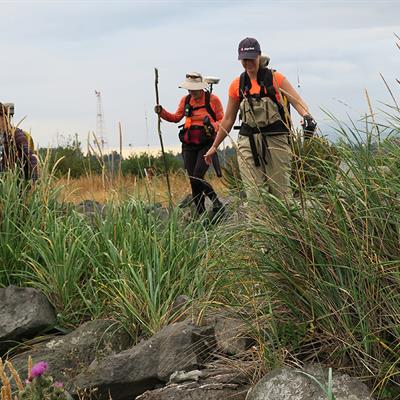Please be aware when registering, all times are in the Eastern Time Zone. Even for free events, you will need to click the "Proceed to Checkout" button and "Submit Order"
to complete your registration. If you do not receive an automated confirmation email, or if you have any questions about registration, please email
onlineseminars@saa.org.

Registration Closed!
Step by Step: Section 106 of the National Historic Preservation Act and the National Environmental Policy Act
When: January 27, 2022 2:00-4:00 PM ET
Duration: 2 hours
Certification: RPA-certified
Pricing
Individual Registration: $99 for SAA members; $149 for non-members
Group Registration: $139 for SAA members; $189 for non-members
Kimball Banks, RPA, is an experienced practitioner of Section 106 of the National Historic Preservation Act (NHPA) and the National Environmental Policy Act (NEPA). Much of that experience was gained in the federal sector, working for the Bureau of Indian Affairs and the Bureau of Reclamation. His work in both agencies involved working with tribes. He organized and held several workshops for tribes on both NHPA and NEPA. In addition, he is an expert on P.L. 93-638 - the Indian Self Determination and Education and Assistance Act. This law give tribes the option to assume the activities necessary to comply with NHPA and NEPA with respect to federal projects or programs for tribes.
J. Signe Snortland holds a B.A. from the University of North Dakota and a M.A. from the University of Manitoba in Anthropology. Snortland is an experienced NEPA (National Environmental Policy Act) and Section 106 (National Historic Preservation Act) practitioner, as well as a former manager of a federal office. She has led teams preparing environmental impact statements (EISs) in Colorado, North Dakota, Minnesota, Montana, and Washington. She served as an Environmental Specialist and Area Archaeologist for the U.S Department of the Interior, Bureau of Reclamation. Previously she was the Chief Archeologist for the State Historical Society of North Dakota (NDSHPO) and conducted thousands of Section 106 reviews.
J. Signe Snortland holds a B.A. from the University of North Dakota and a M.A. from the University of Manitoba in Anthropology. Snortland is an experienced NEPA (National Environmental Policy Act) and Section 106 (National Historic Preservation Act) practitioner, as well as a former manager of a federal office. She has led teams preparing environmental impact statements (EISs) in Colorado, North Dakota, Minnesota, Montana, and Washington. She served as an Environmental Specialist and Area Archaeologist for the U.S Department of the Interior, Bureau of Reclamation. Previously she was the Chief Archeologist for the State Historical Society of North Dakota (NDSHPO) and conducted thousands of Section 106 reviews.
This course is a deep dive into the steps required for compliance with Section 106 of the National Historic Preservation Act (NHPA) and its integration into the National Environmental Policy Act (NEPA). The instructors will cover the roles and responsibilities of the Advisory Council on Historic Preservation, lead federal agency, SHPO, THPO, tribes, consultants, and consulting parties in each step. They will also discuss NEPA in Indian Country in respect to Public Law 93-638, the Indian Self-Determination and Education Assistance Act.
1. Understanding roles, responsibilities, and steps in Section 106 (NHPA) compliance.
2. Learning the relationship between NHPA and NEPA.
3. Increasing awareness of NHPA and NEPA in Indian Country.
2. Learning the relationship between NHPA and NEPA.
3. Increasing awareness of NHPA and NEPA in Indian Country.


